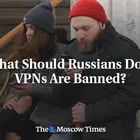Whether Russia will ban access to VPNs from March 1 has been troubling experts and ordinary users for months, with lawmakers and the head of the Kremlin-linked Safe Internet League hinting it could happen.
Today, the Russian version of DPI, TSPU, can block OpenVPN, WireGuard, IKEv2 and other protocols, including Shadowsocks — and that's just what we've heard from our trusted sources. But censors may already be testing blocking and more advanced tools somewhere inside Russia’s borders. What we can say for certain is that the TSPU system is evolving, gaining more and more coverage, and its capabilities are increasing as well.
In Russia, an increasing number of VPNs have been blocked, and there are fewer available that can circumvent restrictions. Some have one or two protocols and many IP addresses, which allows some users to use the service even when the service is blocked. Others have a lot of protocols, including traffic masking, which makes them invisible to censors.
Users in Russia should look into VPN services that can offer one of these protocols. At the moment, AmneziaWG, VLESS + Reality, VLESS over WS and CDN, Shadowsocks-2022, OpenVPN, or Shadowsocks over Cloak are some of the services currently coping with blocking.
Will they work in the future? It's hard to say for sure, as each VPN has its own features, strengths, and weaknesses. But, as things stand, in the near term we will still be able to fight back against the Kremlin’s efforts to control access to the internet.
In any case, it is worth preparing several tools for yourself, which can be gradually put into operation if the previous one fails. Keep in stock proven traditional VPNs with complex protocols, self-hosted VPNs like Amnezia VPN and Outline, and alternative solutions like Lantern, Psiphon, and Tor. You can also use browser plug-ins like Censor Tracker or AntiZapret as a safety net.
 What Should Russians Do If VPNs Are Banned?
What Should Russians Do If VPNs Are Banned?
not_bob wrote
I wish place would not do this bullshit.
Access to a free and open internet is a basic human right at this point.